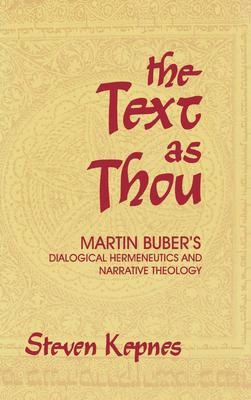The Text as Thou establishes Martin Buber's central concept of "I-Thou" as the heart of a dialogical theory of textual interpretation and a narrative method for explicating Jewish philosophy and theology. Part One takes up Buber's application of his hermeneutic method to the texts of Hasidism and the Bible and the way in which that method can be applied to secular texts as well. His development of a dialogical hermeneutics links Buber to such contemporary theorists as Gadamer, Ricoeur, and Bakhtin. Part Two demonstrates that narrative provides privileged access to Buber's thought. By the retelling of Hasidic tales, biblical stories, and autobiographical anecdotes with powerful immediacy and concreteness, Buber succeeds in a daring attempt to formulate a modern narrative Jewish theology. Taken together, Buber's dialogical hermeneutics and narrative theology constitute a key element in the contemporary revival of the Jewish midrashic imagination.

The Text as Thou: Martin Buber's Dialogical Hermeneutics and Narrative Theology
The Text as Thou establishes Martin Buber's central concept of "I-Thou" as the heart of a dialogical theory of textual interpretation and a narrative method for explicating Jewish philosophy and theology. Part One takes up Buber's application of his hermeneutic method to the texts of Hasidism and the Bible and the way in which that method can be applied to secular texts as well. His development of a dialogical hermeneutics links Buber to such contemporary theorists as Gadamer, Ricoeur, and Bakhtin. Part Two demonstrates that narrative provides privileged access to Buber's thought. By the retelling of Hasidic tales, biblical stories, and autobiographical anecdotes with powerful immediacy and concreteness, Buber succeeds in a daring attempt to formulate a modern narrative Jewish theology. Taken together, Buber's dialogical hermeneutics and narrative theology constitute a key element in the contemporary revival of the Jewish midrashic imagination.